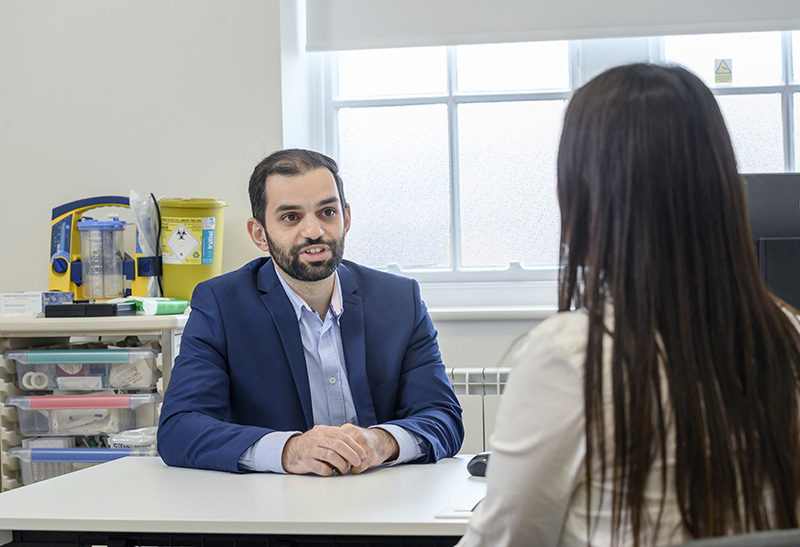Contents
Liver Disease

Liver disease refers to a variety of conditions that affect the liver’s function. The liver is an essential organ involved in digestion, detoxification, and nutrient storage. When compromised, liver disease can significantly impact your health. At The New Foscote Hospital, we offer comprehensive care for liver disease, from early detection to treatment and ongoing management.
Understanding Liver Disease?
Liver disease encompasses a range of conditions that impair the liver’s ability to function effectively. Some of the most common types include:
- Fatty Liver Disease: The accumulation of fat in liver cells, commonly linked to obesity, diabetes, or excessive alcohol consumption.
- Hepatitis: Inflammation of the liver, which can be caused by viral infections (such as Hepatitis A, B, or C), autoimmune conditions, or alcohol abuse.
- Cirrhosis: Long-term damage and scarring of the liver tissue, usually due to chronic liver conditions like viral hepatitis or alcohol abuse.
- Liver Cancer: A serious condition often arising as a complication of chronic liver disease or cirrhosis.
- Hemochromatosis: A genetic disorder that leads to excess iron accumulation, causing liver damage over time.
Symptoms of Liver Disease
The symptoms of liver disease can vary depending on the underlying cause and severity of the condition. Common symptoms include:
- Jaundice (yellowing of the skin or eyes)
- Abdominal pain or discomfort, particularly in the upper right side
- Unexplained fatigue and weakness
- Loss of appetite or nausea
- Dark urine and pale stools
- Swelling in the abdomen or legs
- Itchy skin
- Unexplained weight loss
- Confusion or memory issues in severe cases (due to liver failure)
What Causes Liver Disease?
Liver disease can be caused by a variety of factors which includes:
- Chronic Alcohol Use: Regular, excessive drinking can lead to fatty liver, alcoholic hepatitis, or cirrhosis of the liver.
- Viral Infections: Hepatitis viruses, particularly B and C, are leading causes of liver inflammation.
- Metabolic Conditions: Non-alcoholic fatty liver disease (NAFLD) is associated with obesity, diabetes, and high cholesterol.
- Genetic Conditions: Diseases like hemochromatosis or Wilson’s disease lead to abnormal accumulations in the liver.
- Medications and Toxins: Certain medications or environmental toxins can cause liver damage over time.
How is Liver Disease Diagnosed?
If liver disease is suspected, your private GP or consultant may perform several diagnostic tests to understand the condition:
- Blood Tests: To assess liver function, check for signs of inflammation, and identify potential causes such as viral hepatitis.
- Imaging Tests: Ultrasound, CT scans, and MRIs are commonly used to assess the liver’s condition and identify abnormalities.
- Liver Biopsy: In some cases, a tissue sample is taken from the liver for analysis to determine the extent of liver damage.
- Endoscopy: If cirrhosis is present, an endoscopy may be recommended to check for signs of esophageal varices or other complications.
Treatment Options
reatment varies based on the type and stage of liver disease. Options may include:
- Lifestyle Modifications: Diet changes, regular exercise, and weight management are often recommended, particularly for non-alcoholic fatty liver disease and metabolic liver conditions.
- Medications: For conditions like viral hepatitis, antiviral drugs can help reduce liver inflammation. For cirrhosis, medications may help manage symptoms and slow progression.
- Surgical Interventions: In cases of liver cancer or severe cirrhosis, surgery, including liver transplantation, may be necessary.
- Alcohol Abstinence: If alcohol is the cause, complete cessation is essential to prevent further liver damage.
Preventing Liver Disease
While some liver diseases are genetic or unavoidable, many can be prevented with proper care:
- Maintain a healthy weight and diet, and avoid excessive alcohol consumption.
- Get vaccinated for hepatitis A and B to prevent infection.
- Practice safe sex and avoid sharing needles to reduce the risk of hepatitis B and C.
- Avoid overuse of medications that can strain the liver, and consult your doctor before taking any new drugs or supplements.
When to Seek Medical Help?
If you experience symptoms such as persistent abdominal pain, jaundice, unusual fatigue, or swelling, it is important to seek medical advice. Early diagnosis can help manage liver disease before it progresses to more severe stages.
Arranging To Visit A Private GP

If you are experiencing symptoms that may indicate liver disease, such as stomach pain, yellowing of the skin, or swelling in the legs and ankles, you can book an appointment with one of our private GPs. Our services are available to everyone, with same-day appointments often available. There is no need to be registered with The New Foscote Hospital, nor do you need to live locally.
If your insurance covers GP visits, we can often invoice the insurer directly. For those paying privately, the cost for a 30-minute consultation is £100.
Any additional costs, such as for an endoscopy, consultant referral, or other necessary procedures, will always be discussed with you in advance to ensure complete transparency in your care.
26 March 2025


